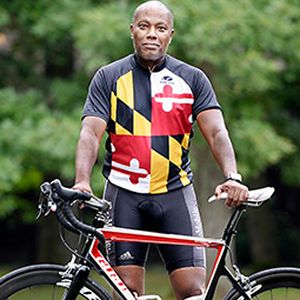
Vincent “Vinny” Jones was an athlete, invincible with endless stamina. The avid cyclist biked an average of 5,000 miles a year, until persistent back pain in 2013 curbed his rides. He went undiagnosed for a year until his annual prostate exam, when his urologist urged him to see an oncologist.
“[I] turned to the place I trusted and felt most comfortable,” recalled Jones. “[The George Washington University (GW)].”
There, he met with Imad Tabbara, MD, professor of medicine at the GW School of Medicine and Health Sciences. Tabbara, “a hero in my house,” said Jones, diagnosed him with multiple myeloma, a cancer that forms in the white blood cells.
“When you’re diagnosed with something like that, you want someone who’s experienced in your disease,” Jones said. “I saw Dr. Tabbara as my coach. I was going to follow his game plan, and I trusted him to call the winning plays.”
Jones, who’d been diagnosed with the most serious stage of myeloma, underwent a biopsy, chemotherapy, and a stem cell transplant.
“My mantra was, ‘I’m going to be the exception to the rule,’ ” he said.
Now in remission, Jones is thankful for the care he received at GW.
“GW has been the best place for me, my family, and my condition,” he said. ““Getting cancer was the last thing I expected for my fate, [but] I’m still here. I’m working, I’m riding my bike, I’m enjoying life thanks to GW.”
GW has been the best place for me, my family, and my condition.



